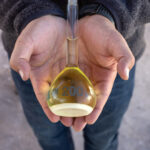To Combat Binge Drinking, a Search for Chemical Solutions
Despite the ubiquity of labels and advertisements reminding those who drink to “enjoy responsibly,” millions of Americans fail to heed the warning. According to the U.S. Centers for Disease Control and Prevention, one in six adults binge drinks about four times a month. Defined as the consumption of four or more drinks within two hours for women, and five or more drinks in that timespan for men, binge drinking is associated with an array of health problems, including alcohol dependence, memory issues, and unintentional injuries.
The problem is global. Alcohol is directly or indirectly responsible for more than 5 percent of all deaths worldwide — or around 3 million annually, according to the World Health Organization. At least seven cancers are linked to its use, and it is considered a causal factor in more than 200 diseases. Heavy drinking, recent research suggests, can even alter DNA, triggering more cravings.
For decades, efforts to curb binge drinking and other forms of alcohol misuse have largely focused on reductions in alcohol purchases, and more vigorous enforcement of laws against underage drinking and drunk driving. But as the problem continues to rise, a growing number of scientists — many of them taking a careful, regulated approach, and some not so much — are turning their attention toward developing chemical solutions.
“Replacing alcohol is going to be a very challenging thing to do,” said David Nutt, a neuropsychopharmacologist at Imperial College London. “The person that does it first is going to become very successful.” Yet Nutt is attempting to do just that.
As reported by The Guardian last week, he is working to raise funding to bring a synthetic alcohol substitute called Alcarelle to market. While the makeup of the product is still under wraps, Nutt told the paper he’s figured out which receptors in the brain can be targeted to provide a buzz without the negative side effects. So far, only he and a few colleagues have tried Alcarelle, as it hasn’t yet been tested for safety. If all goes according to plan, however, Nutt hopes to see the product become available in the next five years.
In the meantime, other products designed to mimic alcohol without the downsides, as well as drugs that work to offset the damage of alcohol abuse, are in various stages of development and marketing — though not always with positive results.
One such product appeared for sale online last year, raising the ire of regulators. In mid-2018, Vancouver-based scientist Ezekiel Golan, who is often referred to as “Dr. Zee” and also appears to go by the name Gordon Ezekiel Glaze, began marketing Pace, an ethanol-free beverage that claims to create a “mild euphoric, alcohol-like tipsy experience,” yet dampens the desire to drink regular spirits. The website for the product, sold through a company called the Diet Alcohol Corporation of the Americas (Dacoa), suggests Pace can replace or be ingested with alcohol. But as an analog of amphetamine and a close cousin to the rave drug MDMA, also known as ecstasy, Pace’s active ingredient caught the attention of authorities. In December, Health Canada, a government agency that regulates food, health products, and pharmaceuticals, declared the beverage illegal.
In a statement to CBC News, Health Canada said it classified the drug, known as MEAI, or (5-methoxy-2-aminoindane), as a Schedule I substance, putting it in the same category as heroin and cocaine. The agency declined to comment to Undark, stating through a spokesperson that they wanted to avoid giving more press to this topic.
According to Golan’s LinkedIn account, he holds a Ph.D. in computational entomology from the University of Queensland in Australia. (When asked in a call whether he had chemistry training, Golan said he received non-accredited education through the Indian Institute of Chemical Technology.) Some of the other drugs he’s developed have been linked to dozens of deaths.
While Golan asserts that his customers and employees haven’t reported any severe side effects from trying Pace, the product’s toxicology evaluation is only based on testing in-vitro and in rats. The Pace website claims the product is currently sold out “due to unprecedented demand,” though Golan revealed that it has not been restocked in part due to a civil investigative demand received by Dacoa from the U.S. Federal Trade Commission to determine whether the company made “unfair, false, or unsubstantiated representations about Pace.”
Regulatory issues aside, Carl Fisher, a bioethicist and an assistant professor of clinical psychiatry at Columbia University, worries that people may turn to drugs like Pace in lieu of proper treatment. “I am skeptical of the idea that some for-profit product will be able to provide an easy ‘cure’ for a complex issue,” he said in an email message. “Binge drinking is not just a problem of biochemistry, it’s a phenomenon that can involve a lot of personal, psychological, and social factors.
“We are enamored of single-drug cures as a society, and especially in medicine,” he added, “but the treatment of substance use problems is rarely that simple.”
Rather than creating new substances to replace alcohol, Sulie Chang, director of the Institute of NeuroImmune Pharmacology at Seton Hall University in New Jersey, is investigating ways to address the problem using existing pharmaceuticals.
Her inquiries have led her to a medication called memantine, which is currently prescribed to reduce Alzheimer’s symptoms. Already used in some small animal and human studies to target binge eating, Chang thinks memantine could fight binge drinking as well.
Other research has shown that the drug can be neuroprotective and anti-inflammatory, and based on her work, Chang predicts that it could be safely taken after a binge drinking episode to reduce inflammation that leads to organ damage, though many questions remain. Still, because memantine is not scheduled and is already used safely in patients, it will be easier to get regulatory approval to study than a newly discovered chemical compound.
Meanwhile, a research team at the National Institute on Alcohol Abuse and Alcoholism, part of the National Institutes of Health, is in the early stages of exploring the gut microbiome as an overlooked target for treating alcohol use disorders.
When the team blocked ghrelin receptors in the gastrointestinal tract, it reduced alcohol consumption in rodents. Ghrelin, also called the “hunger hormone,” is a peptide that regulates appetite. In a preclinical human laboratory study, an experimental ghrelin-blocking drug has been shown to be safe when co-administered with alcohol.
Another study, co-authored by some of the same researchers, notes that “observational studies indicate that endogenous ghrelin levels are positively associated with craving for alcohol, subjective responses to alcohol, and brain activity in response to alcohol cues.”
While these targets could hold promise in reducing the desire to binge drink or in mitigating its effects after the fact, they don’t aim to provide the feeling of inebriation on their own. In that sense, Nutt says, getting Alcarelle accepted could be a challenge. Even if it’s shown to be safe, there’s a chance it might not be approved because it’s something different.
“There’s uncertainty there,” Nutt said, “because of the process of deciding on what drugs should be legal and illegal is so unscientific.”
Though he and Golan once worked together in considering MEAI as an alcohol substitute, the two have since parted ways. “It wasn’t clear,” Nutt said, “whether the safety would be there when you went through the full food safety testing — which you have to do.”
In contrast to Pace, Nutt said he plans to gain approval from regulators before starting sales.
“If we don’t cross that hurdle,” Nutt said, “well, just forget it.”
Troy Farah is an independent journalist and photographer from Southern California. His reporting on science, health and narcotics has appeared in WIRED, Ars Technica, Smithsonian, Discover Magazine, VICE, and others, and he co-hosts the drug policy podcast Narcotica. He can be found on Twitter (@filth_filler) and at troyfarah.com.











Comments are automatically closed one year after article publication. Archived comments are below.
The comedian George Carlin used to say that what we needed was better drugs, and a lot of people agree. It is a normal human urge to ingest psycho-active substances. If safe and non-habituating and non-addictive pleasure drugs can be developed, we would be the better off for it. It’s time to stop criminalizing drug use, and attack addiction with a medical/chemical approach. “Better drugs” can be part of the answer.